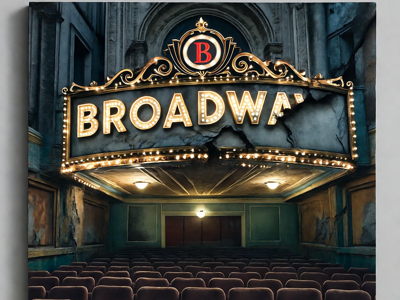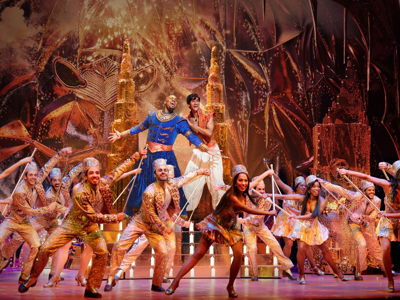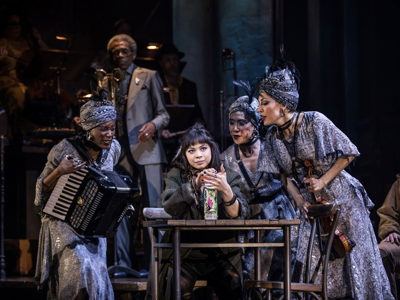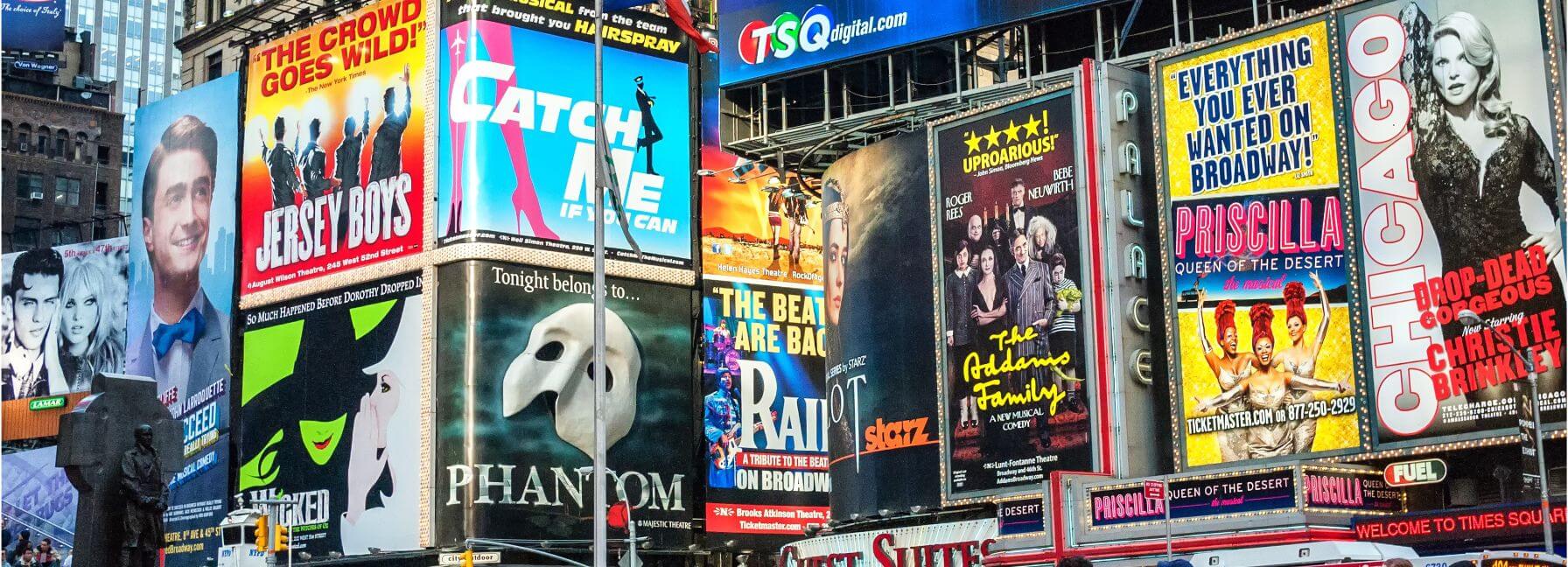Is the Curtain Falling? Broadway's Fight Against Financial Chaos, Fading Incentives, and Labor Standoffs
Alexandra Appleton | Last updated: October 05, 2025
Whether you're the kind of fan who camps out for Hamilton rush tickets or a performer who's poured your soul into eight-shows-a-week runs, we've all felt that pang lately. Scrolling through social media, you catch whispers: "Broadway's in trouble." Empty seats in once-buzzing houses. Shows shuttering before they can even find their footing. And now, with a potential actors' strike looming like a storm cloud over the Great White Way, it's hard not to wonder: Is Broadway dying?

No, it's not dying. But it's hurting. Badly. The finances are a mess, tax incentives are evaporating, and labor tensions could grind everything to a halt. In this post, we'll dive deep into the numbers, the heartbreak, and the hope, backed by fresh stats and voices from the trenches. Because if we love this art form, we need to face the facts—and then fight for its future. Let's break it down.
The Financial Crunch: Record Highs, Devastating Lows
First, the big picture. Broadway's 2024-2025 season just wrapped, and on paper, it looks like a triumph. According to The Broadway League, total grosses hit a jaw-dropping $1.89 billion—the highest in history—while attendance clocked in at 14.7 million tickets sold, the second-best ever. That's a 23% jump in revenue and 19% more butts in seats compared to the prior year. Seats filled to 91.2% capacity across 77 productions, racking up 13,404 performances. It's the kind of stat that makes you want to raise a glass (or a Playbill) to the magic of live theatre.
But peel back the curtain, and the story sours. Those blockbuster numbers are propped up by a handful of long-running warhorses like Wicked, Hamilton, and The Lion King, which continue to draw crowds and fill coffers. Hamilton, for instance, is commanding top tickets up to $1,500 with stars like Leslie Odom Jr. returning, while Wicked rides the wave of its blockbuster film adaptation. Disney's Aladdin and the returning Mamma Mia! (fueled by ABBA nostalgia) are also steady earners, proving that familiarity breeds full houses.

Michael James Scott (Genie) and Michael Maliakel (Aladdin). Photo by Matthew Murphy.
The real pain? New shows are flopping at an alarming rate. Jason Laks, president of The Broadway League, dropped a gut punch in a recent article in the New York Times: Only about 10% of musicals are profitable now—half the historical average. Since the pandemic, 46 new musicals have opened, gobbling up roughly $800 million in capitalization. Just three have recouped: the jukebox hits MJ (Michael Jackson tunes), & Juliet (Max Martin pop anthems), and Six (Tudor queens as girl-group divas). These survivors leaned on government aid—$10 million each for MJ and Six from federal Shuttered Venue Operator Grants, plus a $3 million New York State tax credit for & Juliet. Without that lifeline? Crickets.
Take last season's casualties. Tammy Faye, Elton John's glitzy biopic musical, cost north of $20 million and closed after three months, with Sir Elton himself blaming its "too political" edge for alienating audiences. Boop! The Betty Boop Musical and the TV-inspired Smash fared no better, each hemorrhaging their full investments in under four months. Even revivals bombed: Audra McDonald's Gypsy ($19.5 million budget) shuttered without recouping despite rave reviews; Sunset Boulevard snagged a Tony for best revival but still lost money; and the immersive Cabaret—with its $26 million nightclub overhaul—grossed $90 million (plus merch and drinks) but closed at a total loss, sparking investor lawsuits.
Why the bloodbath? Costs have exploded. A decade ago, Something Rotten! (25 cast members) capitalized at $14 million. Last season's Death Becomes Her (20 actors) hit $31.5 million, thanks to skyrocketing labor, materials (lumber, steel, LED wizardry), rent, and vendor fees. Ticket prices? They've barely budged—averaging $127 last season, up just 3.25% from pre-pandemic levels. Attendance hovers below 2018-2019 peaks, and an oversupply of post-COVID backlog shows flooded the market, diluting audiences.
As producer Tom Kirdahy (Hadestown) laments: "Shows that are even selling a million dollars in tickets a week can’t survive... It’s absolutely heartbreaking. It means people are out of work, dreams are dashed." (NYT)

Eva Noblezada and the Broadway cast of Hadestown. Photo credit Matthew Murphy.
And composer Andrew Lloyd Webber? "Broadway is not a business anymore. The statistics are terrible. I am very worried." I look at the economics of this, and I just don't see how it can sustain." (NYT)
Yet there are glimmers of hope. The Outsiders (Tony winner for Best Musical) and Just in Time (Jonathan Groff as Bobby Darin) are on track to recoup, proving fresh stories can still spark. Plays, too, are faring better—seven turned profits last season, like George Clooney's Good Night, and Good Luck and Denzel Washington's Othello, which shattered box-office records with star power and shorter runs.
Tax Troubles: The Incentive That's Fading to Black
Layer on the tax woes, and the plot thickens. New York's Musical and Theatrical Production Tax Credit—launched post-pandemic with $400 million—has been a godsend, doling out 25% credits to qualifying shows produced in city venues. It's helped bankroll hits like & Juliet and kept understudies paid during lean times. But as of July 2025, the pot's nearly dry, with funds projected to vanish by the end of the month. Deadline for new applications got a one-month lifeline to October 20, but that's it—no renewal in sight as yet.
This isn't just bean-counting; it's survival. The credit has propped up profitability for shows that might otherwise fold, especially amid rising rents and shrinking margins. Critics like Crain's New York argue it should end—calling it a "pandemic-era" crutch that's overstayed—but Governor Kathy Hochul wants to extend and expand it, recognizing Broadway's $15 billion economic ripple (jobs, tourism, you name it). Without it, producers warn of fewer risks, more jukebox retreads, and a chilling effect on innovation. As one editorial put it, "What if Broadway left New York?" With fading credits and ballooning costs, that's not hyperbole—it's a wake-up call.
For us fans and artists, it means pricier tickets or emptier stages. Imagine The Queen of Versailles (Kristin Chenoweth's fall opener) or Two Strangers (Carry a Cake Across New York) struggling without that boost. Or worse, bold swings like the upcoming Purple Rain musical or The Lost Boys adaptation getting shelved before they dazzle.
The Strike Shadow: Health, Hearts, and a Shutdown Looms
And just when you thought it couldn't get tighter—enter the strike threat. Actors' Equity's contract expired September 28, 2025, and talks have stalled. The union's authorized a walkout, the first since 1968, which could shutter all 32 Broadway productions during peak fall season. Over 1,000 actors have signed "strike pledge cards," ready to hit the bricks.
At the core? Healthcare. Employers' contributions to the union's fund haven't budged in over a decade, even as regional theaters in Kansas or Idaho pay more. The fund's eyeing a deficit by May 2026, and performers—whose jobs involve flips, fights, and eight hours of belting—face mounting injuries. As The Lion King ensemble member Kaylin Seckel shared in a recent article in The Guardian, "Three years ago, I required... more physical therapy that I was denied under workers' comp... Without really good health insurance, it's difficult for us to do our jobs."
Equity President Brooke Shields nailed it in a recent article in The Guardian: "That’s just math. There are no Broadway shows without healthy Broadway actors and stage managers. And there are no healthy actors and stage managers without safe workplaces and stable health insurance.”
But with no deal, the clock's ticking. A full strike? It'd echo 1968's three-day shutdown of 19 shows, but on steroids—devastating tourism, crews, and dreams mid-season.
The Encore: Not Dead, But We Need to Rally
Broadway is not dying. It's evolving, battered but beating. Record grosses prove audiences crave the escape—the communal gasp at a perfect high note, the tear-streaked applause. Hits like Operation Mincemeat (a cheeky WWII caper that's packing houses) and Buena Vista Social Club (Cuban rhythms reborn) show innovation thrives when we bet on it. Fall's slate—Keanu Reeves in Waiting for Godot, Michelle Williams in O'Neill's Long Day's Journey Into Night—promises star wattage and soul.
But we can't applaud from afar. Fans: Snap up tickets to those underdog shows where you can! Performers: Union strong—your health is non-negotiable. And policymakers? Renew those tax credits; Broadway's your golden goose. We've survived pandemics, recessions, and worse. Let's lace up our tap shoes and demand better: fair wages, safe stages, sustainable funding. Broadway is calling us to save the show!
Originally Published: October 05, 2025
Last Updated: October 05, 2025
Blog Written By:
More From Broadway
Welcome to StageAgent
Our mission is to provide actors, directors, teachers and backstage staff with the ultimate theatre research and education platform.
Enjoy amazing theatre resources:
Browse Blog Categories
Auditions and jobs
near
{{headerProps.location}}
Upcoming performances

